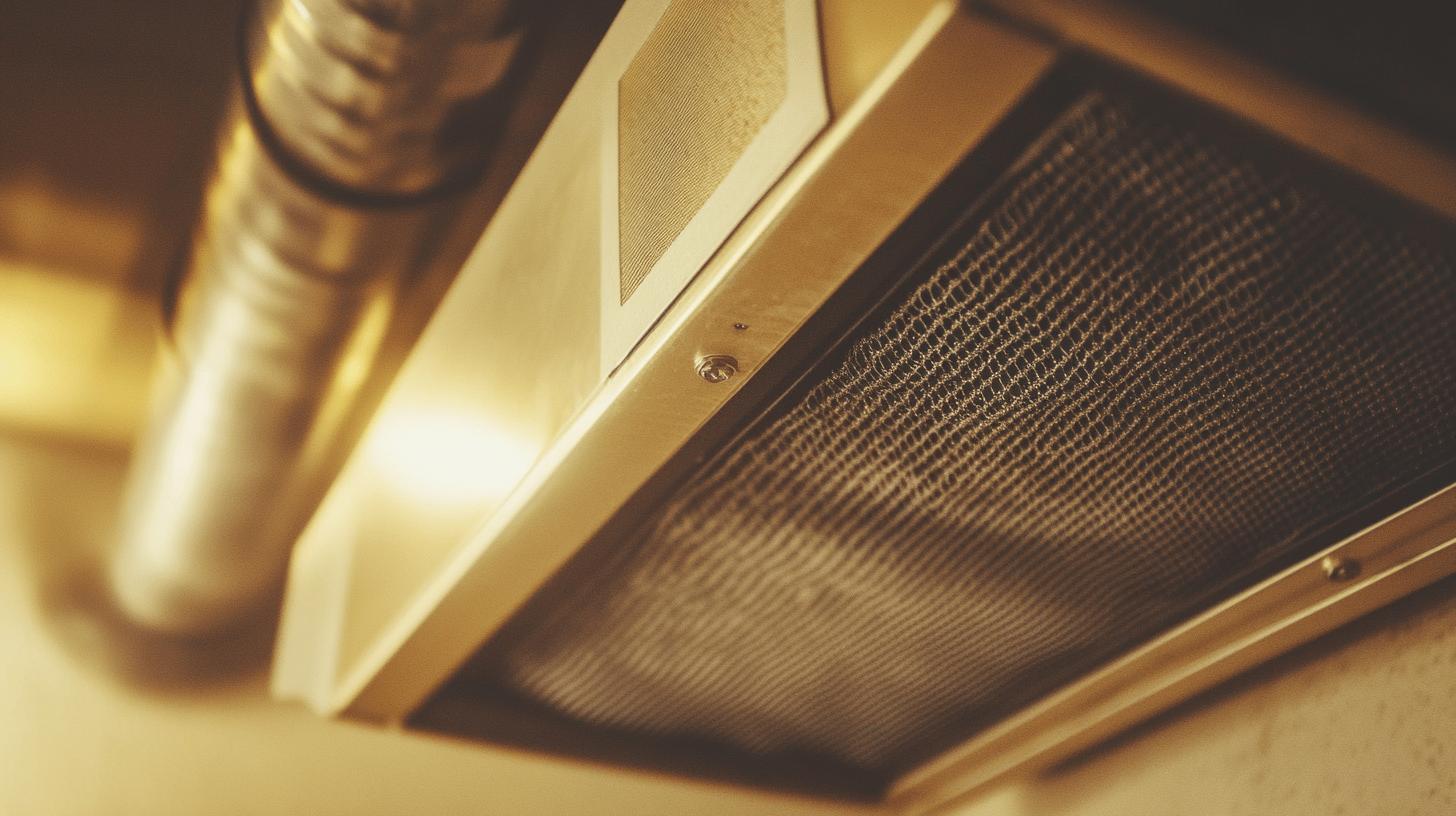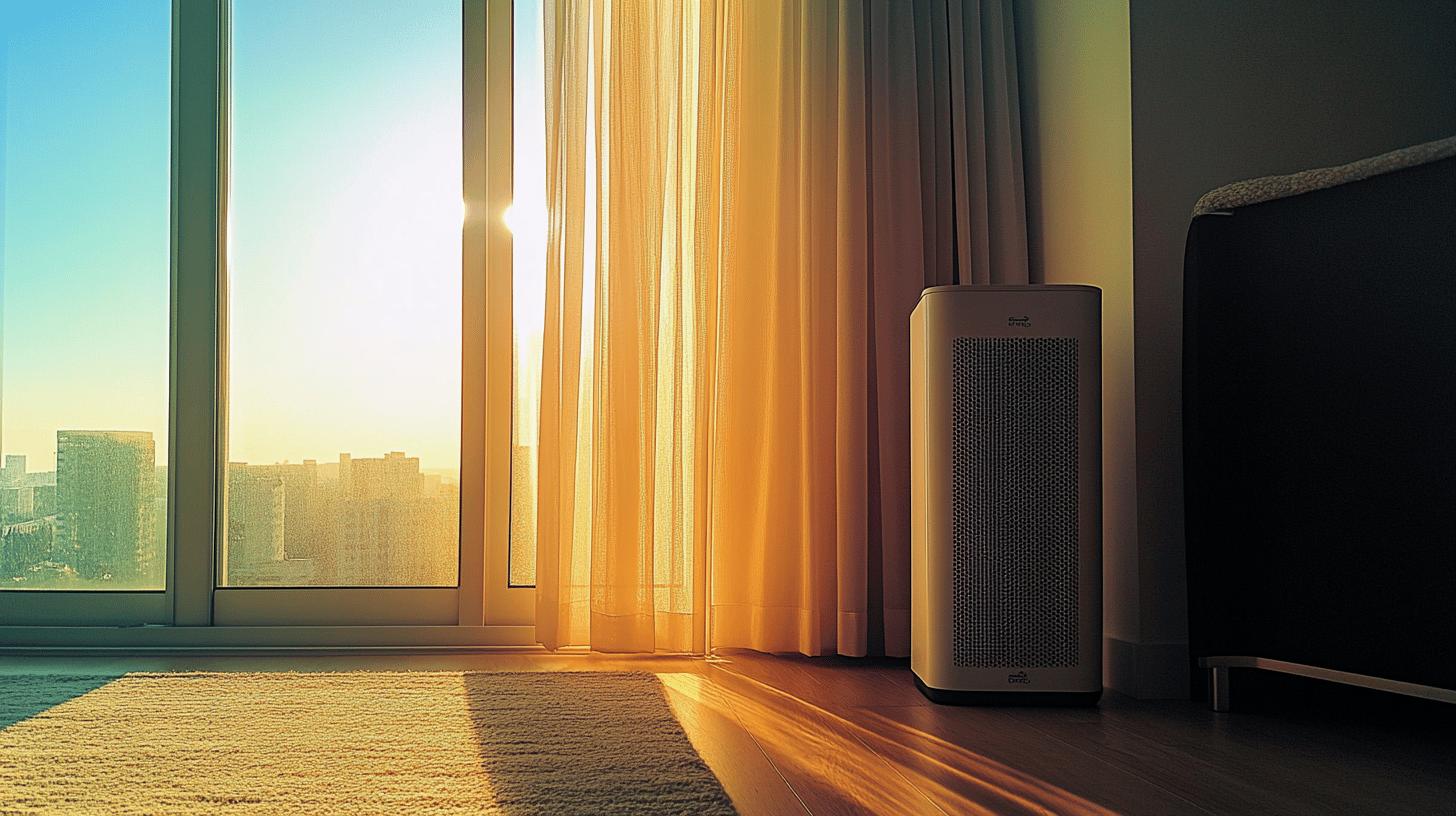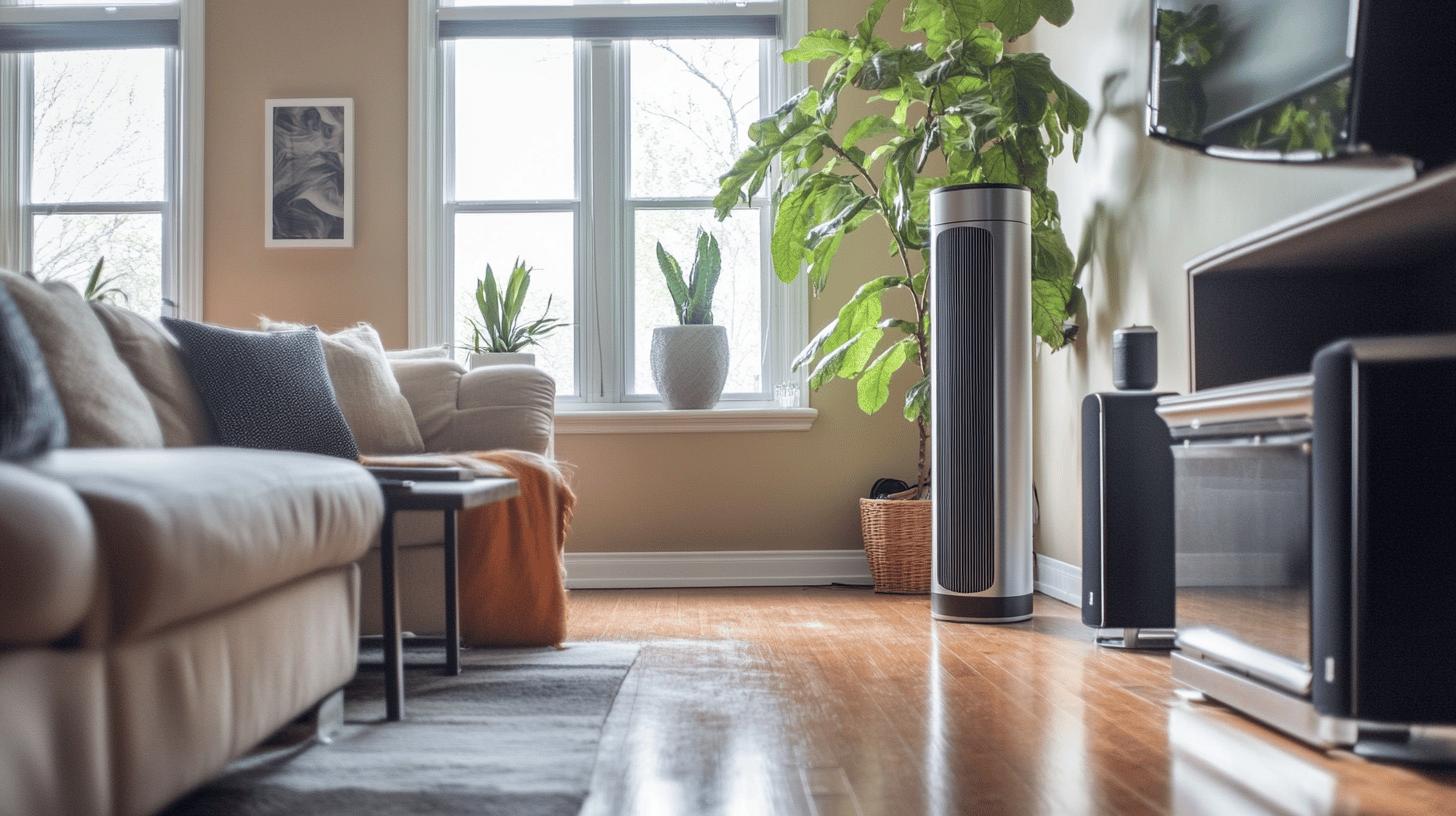TL;DR:
- HVAC systems manage temperature, humidity, and air quality with components like furnaces, ACs, and ducts.
- Air purifiers remove pollutants like dust, pollen, and smoke.
- Whole-house purifiers are more efficient than portable units, improving air quality throughout homes.
- UV-C light purifiers eliminate microorganisms and enhance air purity when integrated into HVAC systems.
- Key factors for choosing air purifiers: MERV ratings, system compatibility.
- Types include HEPA (99.97% efficiency), UV-C, and activated carbon.
- Professional installation and maintenance are crucial for HVAC air purifiers to ensure efficiency and longevity.
- Regular tasks: filter replacement, system inspections, duct cleaning, and monitoring performance.
Is the air in your home as clean as you think? Your indoor air might actually have more pollutants than you realize. By adding an air purifier to your HVAC system, you can really improve the air you breathe. It helps filter out dust, pollen, smoke, and more. This combo not only controls the temperature but also makes the air healthier, giving you cleaner air to breathe. Find out how this setup can make your home more comfortable and improve your well-being.
Understanding HVAC Systems with Air Purifiers
Your HVAC system is key to keeping your home comfortable by controlling temperature, humidity, and air quality. It usually includes a furnace or heat pump, air conditioner, ductwork, and vents, all working together to circulate air. Adding an air purifier to this setup takes things up a notch by removing harmful particles from the air. While the HVAC system keeps the climate in check, the air purifier makes sure the air you breathe is cleaner and healthier.
Common air pollutants that air purifiers tackle include:
- Dust
- Pollen
- Smoke
- Pet dander
- Bacteria and viruses
Using an air purifier with your HVAC system brings major benefits. It filters all the air that circulates through your home, not just the air in certain rooms. This improves air quality everywhere, making your home healthier. Cleaner air reduces allergens and pollutants, helping with breathing problems and boosting comfort. It’s best to have a professional install the system to make sure it works properly and keeps your air quality high.
Benefits of Using a Whole House Air Purifier with HVAC

Indoor air quality is really important because, according to the EPA, indoor air can be up to five times more polluted than outdoor air. Pollutants like dust and pollen can harm our health. A whole-house air purifier, which works with your HVAC system, traps these pollutants, making your home cleaner.
Whole-house purifiers are much better than portable units. While portable ones only clean the air in specific rooms, whole-house systems work throughout your entire home. They clean the air as it flows through your HVAC system, offering a level of purification that portable units can’t match.
Improved air quality can have great health benefits. These systems help reduce allergens and pollutants, which can ease allergy symptoms and make breathing easier. Cleaner air also lowers the risk of infections and boosts overall health. For the best results, it’s a good idea to have these systems professionally installed.
How UV Light Air Purifiers Function within HVAC Systems
UV-C light purifies the air by using UV radiation to destroy the DNA of harmful microorganisms like bacteria, viruses, and other pathogens. This radiation neutralizes these microorganisms, preventing them from reproducing and spreading, which makes the air cleaner and safer to breathe.
In an HVAC system, UV light purifiers are typically installed near the evaporative coil or within the ductwork. As air flows through the system, the UV light treats it, killing microorganisms before the air is spread throughout the home. When combined with high-quality filters, UV light enhances the overall purification process by targeting smaller particles that might pass through regular filters.
Microorganisms targeted by UV light include:
- Bacteria
- Viruses
- Mold spores
- Fungi
UV light air purifiers offer several benefits, the main one being a reduction in airborne pathogens, which leads to a healthier indoor environment. By eliminating bacteria, viruses, and other microorganisms, they can help alleviate allergy symptoms and improve breathing.
However, there are a few considerations to keep in mind. Professional installation is crucial to ensure the system is set up properly for maximum effectiveness. The placement of the UV light and its intensity need to be optimized to get the best results. Additionally, regular maintenance and checks are necessary to keep the system working efficiently and to ensure it continues to sanitize the air effectively.
Choosing the Best Air Purifier for Your HVAC System

When selecting an air purifier for your HVAC system, it’s important to consider factors like MERV ratings and system compatibility. MERV ratings indicate how well filters trap particles, with higher ratings offering better filtration. Be sure to choose an air purifier that is compatible with your HVAC system to avoid airflow issues and ensure optimal performance.
There are different types of air purifiers to choose from, each with its own benefits. HEPA filters are excellent at capturing small particles like dust and pollen, making them great for allergy sufferers. UV-C light purifiers target microorganisms, offering protection against bacteria and viruses. Activated carbon purifiers help eliminate odors and VOCs, improving overall air freshness. Depending on your air quality concerns, you can pick the purifier that best suits your needs.
| Air Purifier Model | Features | Efficiency |
|————————|————————————————|————|
| Intellipure SuperV | Removes particles as small as 7 nanometers, MERV 16 | 95% |
| Honeywell HEPA | True HEPA filter, captures 99.97% of particles | 99.97% |
| Reme Halo | UV-C and ionization technology, reduces odors | Varies |
Choosing the right air purifier is all about balancing efficiency with your HVAC system’s capacity. Models like the Intellipure SuperV, which have high MERV ratings, are great for strong filtration. Depending on what’s in the air—whether it’s allergens, smoke, or other pollutants—each home will have different needs. Consulting a professional can help customize your air purification system, ensuring it fits your specific requirements and provides the best indoor air quality.
Installation and Maintenance Tips for HVAC Air Purifiers
Professional plumbers should install HVAC air purifiers because they have the expertise to ensure proper system compatibility and correct installation. HVAC systems are complex, involving intricate ductwork and airflow dynamics. Professionals know how to position air purifiers for maximum efficiency, preventing issues like airflow restrictions or misalignment. This helps ensure the purifier works effectively and lasts longer, improving your home’s air quality without causing damage to the system.
Essential maintenance tasks for HVAC air purifiers include:
- Replacing air filters every 3 to 6 months based on use and air quality
- Periodic system inspections to catch issues early
- Cleaning ductwork to prevent buildup that can hinder airflow
- Checking UV light components to ensure functionality
- Monitoring performance for signs of needed maintenance
- Scheduling annual professional inspections for optimal operation
To find NADCA-certified professionals, you can use the National Air Duct Cleaning Association (NADCA) directory. It’s important to choose certified experts because they are specifically trained to handle air purification systems and manage microbiological contaminants. Regular maintenance by NADCA-certified professionals ensures your system operates efficiently, lasts longer, and maintains high air quality. These experts conduct thorough inspections and cleanings to reduce contamination risks and optimize purifier performance, leading to a healthier, cleaner home environment.
Final Words
Integrating an air purifier with your HVAC system can greatly improve indoor air quality. In this post, you learned how HVAC systems and air purifiers work together to filter out pollutants like dust, pollen, and smoke. You also explored the health benefits of whole-house air purifiers and the effectiveness of UV-C light in killing harmful microorganisms. Choosing the right system, understanding MERV ratings, and ensuring professional installation are key steps for optimal performance. By enhancing your HVAC system with an air purifier, you create a healthier living environment with cleaner air for you and your family.
FAQ
Q: Are air purifiers in HVAC worth it?
A: Air purifiers in HVAC systems are worth it as they consistently filter and improve indoor air quality throughout the entire house, reducing allergens and pollutants more effectively than portable units.
Q: Can an air purifier be installed in a HVAC system?
A: Yes, an air purifier can be installed in an HVAC system to ensure all circulated air is filtered, maintaining consistent and improved air quality within the home.
Q: How much does it cost to add an air purifier to HVAC?
A: Adding an air purifier to an HVAC system typically costs between $500 and $2,500, depending on the system type and installation complexity.
Q: Do HVACs purify air?
A: HVAC systems regulate air quality but primarily focus on temperature and humidity. Installing an air purifier enhances an HVAC system by effectively removing contaminants from the air.
Q: What is the best air purifier for an HVAC system?
A: The Intellipure SuperV is recommended for an HVAC system due to its efficiency in removing small particles and its high MERV 16 rating for superior air filtration.
Q: What are the benefits of using a whole house air purifier with HVAC?
A: Whole house air purifiers improve indoor air quality by effectively reducing dust, pollen, and other pollutants throughout the entire home, offering allergy relief and better respiratory health.
Q: How do UV light air purifiers function within HVAC systems?
A: UV light air purifiers in HVAC systems use ultraviolet-C light to destroy the DNA of harmful microorganisms, enhancing air purification by targeting contaminants a regular filter might miss.

